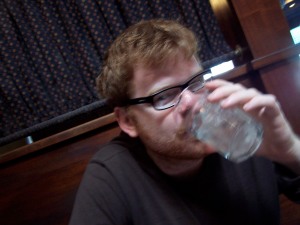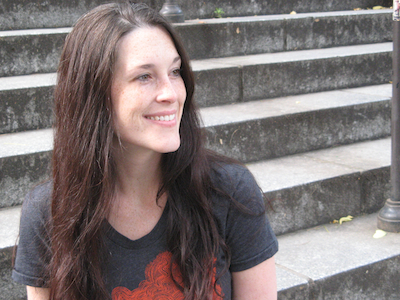An introduction to poet Elliot Harmon, who initially made a name for himself through performance poetry. Harmon shared, “I think that performance still plays a role in what I write, and I love having the opportunity to perform in different contexts. There was a while there when I was traveling a lot and I was really active in the slam scene. Performing things over and over was a big part of how I revised and worked. That’s not the case anymore because I have a full-time job and not as much opportunity to do that stuff. It’s changed how I work.”
Quick Facts on Elliot Harmon
- Harmon’s website
- Home: San Francisco, California
- Comfort food: I’m philosophically a vegetarian, but my comfort food is definitely chicken nachos from Carl’s Jr. When I was in graduate school, junk food was a like a natural part of my writing process, and I was really fat as a result of that.
- Top authors: David Antin, Frank O’Hara, John Giorno, Kenneth Patchen, Bertolt Brecht, Antonin Artaud
- Current reads: Thing of Beauty: New and Selected Works by Jackson Mac Low, Skippy Dies by Paul Murray
What are you working on at the moment?
I have been, off and on for a couple of years, working on a one-person show, which is basically a lot of my poems strung together with me talking and doing various things in between them.
I’ve also been really interested lately in things like the Fluxus artists, people like Eleanor Antin and even Yoko Ono. They would do these things that were kind of theatrical, and kind of like “instructions for performances” but were not really scripts or even necessarily performable. I’m writing things that are in the spirit of that sort of stuff.
What do you hope people will take away from your work?
I’ve spent more time being an ex-slam poet than I spent being a slam poet. Sometimes I feel like that spoken word ethos haunts a lot of my poetry. I’m interested in writing that doesn’t necessarily seem particularly difficult or experimental when you first look at it, but the longer you spend with it the more the internal contradictions of it become apparent. For instance, that’s what David Antin’s writing is all about, and people who haven’t figured that out should spend more time reading him. I guess that’s what I would like to think that I do as a poet.
Who do you picture as the ideal reader of your work?
I wrote this poem in college called “The Ideal Reader.” It’s not online anywhere. It’s not very good. It’s me talking to all these different people and asking if they are the ideal reader. I finally decide that the ideal reader is the inventor of the McFlurry.
Actually, I write poems for specific people a lot. So the ideal reader of this poem is Marcus, or it’s Patrick, or my wife. It’s okay with me to have writing that isn’t universal, that maybe nobody will care about in another ten years.
Where and when do you prefer to write?
Before my current life, my writing usually took place between midnight and three or four in the morning. I can’t really do that anymore. I try to spend an hour or two every night, or at least three or four nights a week, with my writing just visiting it and seeing what needs to be done. That’s also the time I figure out what I’m submitting. I know a lot of people say that those should be two separate processes that don’t infiltrate each other, but they totally do for me. At least once a month I try to have a day when I don’t have anything else going on and I can plow in and focus on that stuff.
Where would you most want to live and write?
I recently spent a week in India. I’d love to have the opportunity someday to live there at least for a short time. Mumbai is an amazing city.
What do you listen to when you work?
I can’t read or write while listening to things with lyrics, but there’s some instrumental classical music that I listen to while I write. I like Morton Feldman’s music a lot.
Do you have a philosophy for how and why you write?
A lot of my poetry has to do with music and with religion, and with this kind of cultural detritus that people grow up with, and the way in which you navigate those things. Also, how you figure out the way to separate the wheat from the chaff is this really personal thing for me. It’s an ongoing process where I’m always trying to figure out what I believe, what I think about different things. In a way, poetry is a record of me doing that, but it’s also something that I would like to think can completely stand on its own without being connected to my life.
How do you balance content with form?
Rick Barot was my mentor during my first semester at graduate school. We had this discussion during our first meeting that really pissed me off at the time, but since then has set the tone for what I’ve done with graduate school and after that time. He asked me to send a bunch of poems to him before our first meeting so he could get an idea about my writing. I sent him a lot of work that I had been using for poetry slams. He basically said, “I want you to think of all of this writing as your juvenilia, and as graduate school as a chance to get away from that and develop your voice as a writer.” That made me so, so mad when he said that. But, what he was really saying was about form. He was saying that it is impossible for form not to be a part of what you write. If you try to write as if only the content matters, it will just make your poem look crappy because you completely disregard form (and not in an interesting way).
So in grad school, I paid a lot of attention to form, sometimes even counting syllables. Sometimes people don’t notice that and just see me as a narrative poet. To me, forcing myself to really think about line not only improved my poetry formally but it also improved my content by making me focus and tighten up my language. But, it’s not just that! I started realizing that meaning is impossible to separate from form. There’s that thing that Robert Creeley said, something like “Form is nothing more than an extension of content.” When somebody asked him about it later, he said that he could have also stated it the other way around.
Is there a quote about writing that inspires you?
There’s a poem by Brecht called “Speech to Danish Working Class Actors on the Art of Observation.” It’s been an inspiration for a long time for me. I even wrote a poem about it titled “Bertolt Brecht Address World Championship Wrestling Circa 2000.”
What advice would you give to aspiring writers?
Get good at other things. The really great writers have a body of knowledge that they draw from that is not just related to writing.
What’s the best advice you’ve been given as a writer?
I met GC Waldrep once and I talked to him about going to graduate school. He said something to the effect of, “If you need to go to graduate school for your career or whatever, then that’s great. But don’t worry too much about it. It’s just graduate school. It’s just writing.”
Is there anything that you wish people would ask you more often about your work?
Religion plays a bigger role in my work than I think most people realize.
What do you find most challenging about writing?
There was a time when I thought that when people talked about not having enough time to write they were just being really lazy. But increasingly, I can see that—not just having time, having mental space to do it.
When you’re not writing, what do you like to do?
I like listening to music. I’ve been playing a lot of Sudoku recently.
About Elliot Harmon
Elliot Harmon’s poetry has recently appeared in Diagram, Sorry for Snake, NOÖ Journal, and You Are Here. He has degrees from the University of South Dakota and the California College of the Arts. He lives in San Francisco.
[Toffoli, Marissa B. “Interview With Writer Elliot Harmon.” Words With Writers (January 4, 2011), https://wordswithwriters.com/2011/01/04/elliot-harmon/.%5D




[…] Steffi (2010) Duggan, Patrick (2012) Flowers, Arthur (2011) Foerster, Jennifer Elise (2013) Harmon, Elliot (2011) Hirshfield, Jane (2011) Mandanipour, Shahriar (2010) Mohamadi, Sheida (2011) Newman, […]
Reblogged this on matthewriter and commented:
Promoting the red-headed poet whose mom ran my daycare, circa 1984…
I really love this site and the format of the interviews. The whole process is very cerebral and reading it helps me ground my own thoughts. I liked what Harmon said about “meaning is impossible to separate from form” because, as a designer, I live this everyday. Good to see that it crosses over.
I also totally agree with needing not time, but mental space. When I’m done with work at the end of the day, I struggle to focus on my own projects.
Great interview! Thanks for posting!